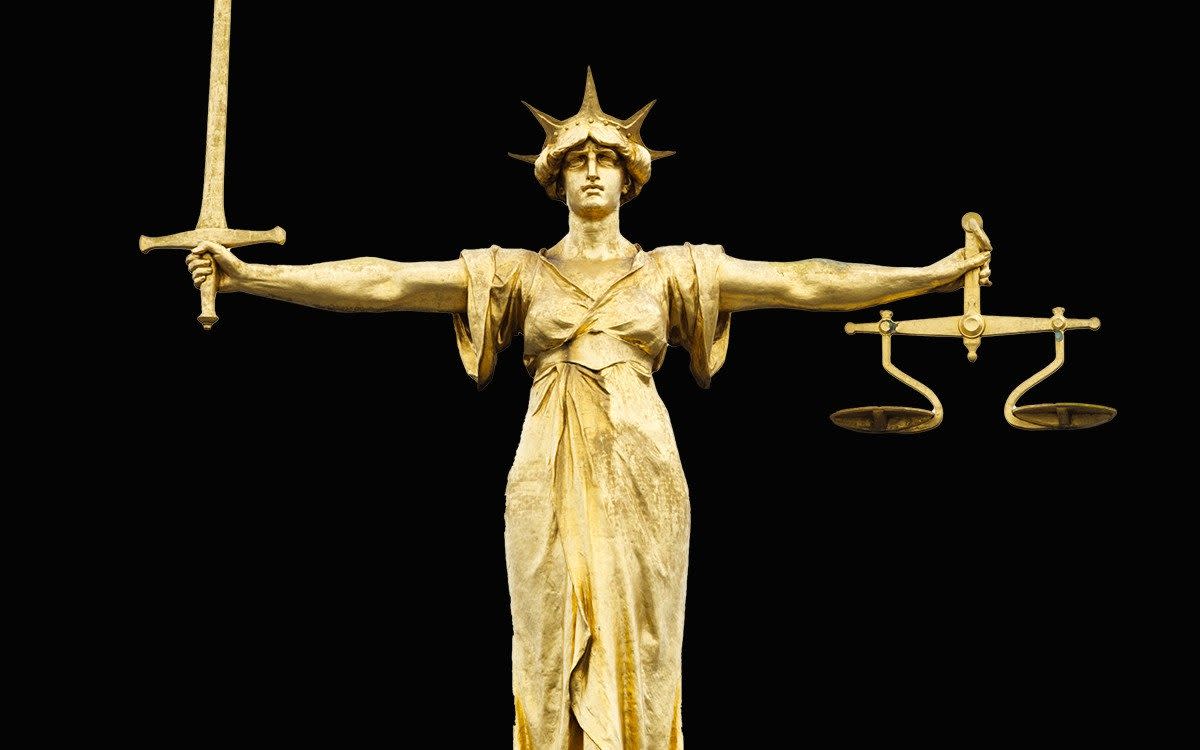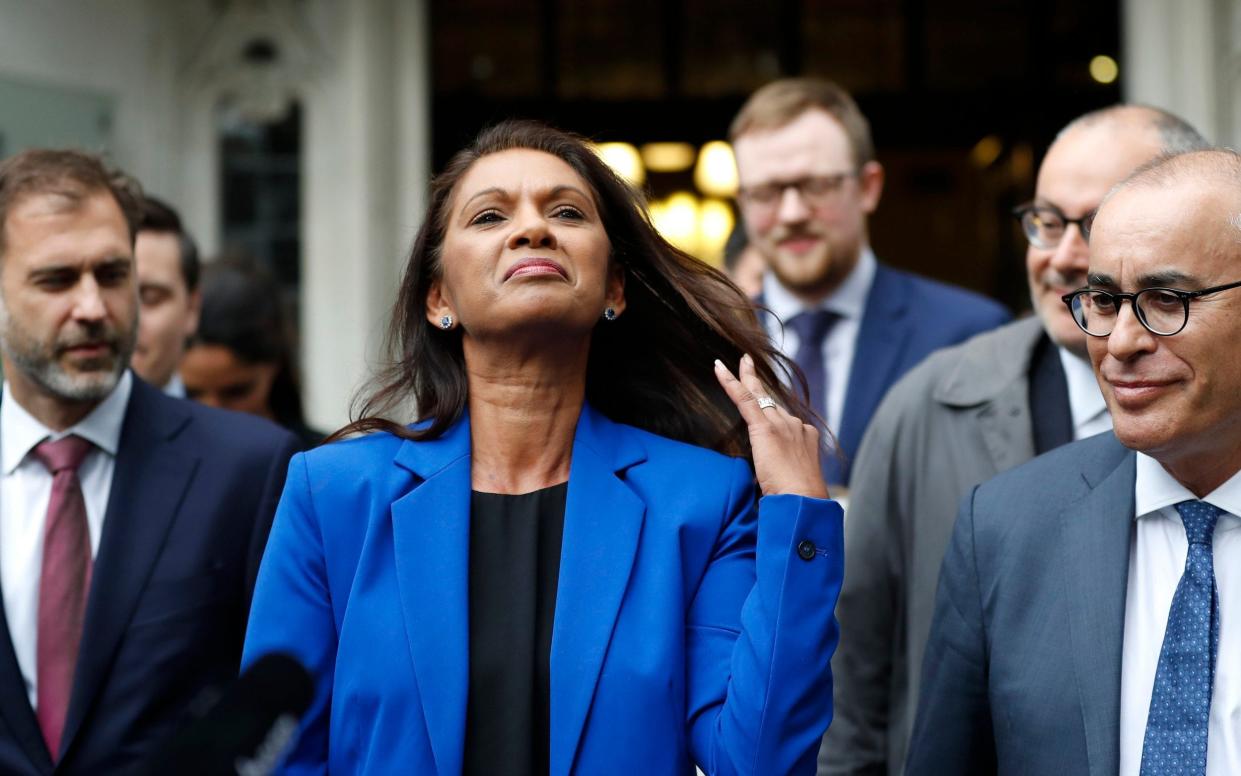How the Left ‘weaponised’ the legal system – on the Tories’ watch

When Boris Johnson controversially decided to suspend Parliament before the Brexit deadline in 2019, a legal challenge by a prominent pro-Remain campaigner resulted in a dramatic constitutional showdown. Following a judicial review brought by Gina Miller, the Supreme Court unanimously ruled – in a now-famous judgment – that the then Conservative prime minister’s prorogation of Parliament was unlawful. As a result, MPs would return to the Commons against Johnson’s wishes.
The outcome was welcomed by Johnson’s critics and political opponents. A No 10 source, meanwhile, claimed the Supreme Court had “made a serious mistake in extending its reach to these political matters”.
The Conservatives’ 2019 manifesto pledged to ensure that the courts were “not abused to conduct politics by another means or to create needless delays”. The pledge was thought to have been influenced by Dominic Cummings, Johnson’s chief adviser, a vocal critic of the process who had written on his blog that “major reform” was required in this area.
Rishi Sunak then picked up the theme, declaring during his leadership campaign in 2022 that repeated “vexatious judicial reviews by political campaigners are clogging up the courts, costing us a fortune and acting as a drag on the government delivering for the public”.

If he became prime minister, he promised, he would “call time on campaigners politicising our courts”.
The Conservatives’ desire to crack down on what they regard as politically motivated judicial reviews - or “lawfare” - stretches back some way. In 2012, David Cameron vowed to “get a grip” on the situation, tackling the “time-wasting” caused by the “massive growth industry” in legal challenges to government policy.
But if the intention to do so has been repeatedly stated, it’s less clear that the rhetoric has been matched by results. This week, headteacher Katharine Birbalsingh won a judicial review brought by a Muslim pupil over her school’s prayer ban. The case, though not directed against the Government, was the latest high-profile example of the process in action.
Data suggests the number of applications for judicial reviews has not in fact been falling. Recent government figures instead point to an increase in non-immigration judicial review claims. Judicial review applications increased to 2,500 in 2023, up four per cent on the 2022 calendar year.
Since 2020, there have been 10,154 judicial review applications, according to Ministry of Justice figures. Of those, 1,829 were granted, 4,071 were denied permission to proceed, and 4,254 had “other outcomes”, such as being withdrawn, adjourned or resubmitted.

To put these numbers in context, in the early 1980s, there were around 550 cases a year, including immigration cases. Now, “there are now almost that many civil, non-immigration applications for permission alone per quarter,” wrote lawyers Sir Jonathan Jones (formerly the Government’s most senior legal adviser) and Alexander Fawke, in a December 2023 article for law firm Linklaters.
“The reality is that this government has in many respects ushered in a major expansion of judicial review, especially in new and high-profile areas,” stated Jones and Fawke. “It has done this both as a government and as a litigant itself – a striking (though perhaps unusual) example being its challenge to the Covid Inquiry’s demands for Johnson’s WhatsApp messages.”
They attribute this expansion to a variety of factors, including Brexit and its accompanying relocation of decisions from Brussels to Whitehall; the Government’s appetite for legal risk; and a lack of experience in its upper echelons, given the high turnover of prime ministers and secretaries of state.
They also cite longer-term reasons, including the fact that governments are having to regulate in new areas such as technology, “which means more scope for challenge”.
David McNeill, director of public affairs at The Law Society, suggests that spending cuts could also lie behind the increase, on the basis that “when public services are being withdrawn or limited or rationed, the possibility [the authority] will clash with an individual or interest group increases”.
Social media has opened up new routes for attracting funding for a cause, he points out. Meanwhile, the dramatic reforms promised by Boris Johnson have failed to materialise.
In an effort to tackle an apparent proliferation of judicial reviews, the Government commissioned an independent review in 2020, led by Lord Faulks KC. However, the report concluded that the system was largely working just as it should.
Not all judicial reviews, of course, are brought against central government (as the recent Michaela Community School and Katharine Birbalsingh case shows). The process, which dates back to the 16th century, is designed to ensure all public bodies with statutory powers make decisions in a fair and rational way. This includes local authorities and quangos. The reviews are designed as a form of protection for individuals and organisations; a legal recourse if a public body is thought to be undertaking measures without following the right process.
But Conservative MPs, from Johnson and Sunak to junior backbenchers, have warned that the mechanism is increasingly being misused by the Tories’ opponents to frustrate political decisions.
Lee Anderson, the Conservatives’ former deputy chairman, who has since defected to Reform, insisted last year that the Government had implemented measures to tackle illegal migration but that “everything is against us”, including “lefty lawyers”, while ministers have warned of instances of the courts “being weaponised”.
John Hayes, a former transport minister and chairman of the Common Sense Group of Tory MPs, says: “The purpose of the courts isn’t to second-guess legislative decisions.
“Successive prime ministers have recognised the growing problem, and it’s particularly a problem because very well-funded campaign groups can go to judicial review because cost is not a barrier for them.”
It’s true that judicial reviews don’t come cheap. The claimant must budget for lawyers’ fees, court fees and, if they lose, they will often be liable for their opponent’s legal costs. “It’s not just and fair to use an alternative means when a [political] decision goes a way you don’t like, to ensure that those who have lost the argument win it,” says Hayes.
While the Government has taken steps to try and crack down on this, he believes further action could be taken “to stop [judicial reviews] being used to game the political process”.
Lawyers describe this as a mischaracterisation of what judicial reviews actually do. McNeill says: “The outcome of most [successful] judicial reviews is the Government or public body has to do its homework again and do it properly. It’s not that they are stopped from [carrying out] a legitimate policy aim, but they’ve got to do it within the rules and do it sensibly.”

Awareness of judicial review as a way of challenging public authority has been growing for some decades, he says. But recent years have seen some particularly high profile cases. In 2021, Shamima Begum, one of three London schoolgirls who travelled to Syria to join Islamic State, lost a judicial review against a decision to refuse her permission to come to Britain to prosecute her appeal against the removal of her British citizenship.
The Good Law Project (GLP), run by Jolyon Maugham, a prominent anti-Brexit KC, has brought multiple judicial reviews in recent years, attracting particular ire from Sunak.
Announcing his plans to crack down on judicial reviews of government policy in his 2022 campaign, Sunak mentioned Maugham repeatedly. To which Maugham retorted that the Good Law Project was “uncovering billions of your money wasted by this government’s cronyism and sleaze”.
Cases it has brought include a judicial review of PPE contracts awarded by the Department of Health and a decision to hand a communications contract to Public First, a firm linked to Cummings.
According to Maugham, it is “obvious” that “the person who brings a judicial review has a particular agenda, otherwise they wouldn’t be incurring the costs”.

Judicial reviews have also been brought by environmental campaigners over the Government’s commitment to net zero. In 2022, ministers were ordered to outline how their net zero policies would enable them to hit emissions targets, following a case brought by groups including Friends of the Earth and GLP.
Last year, broadcaster Chris Packham sought a judicial review of the Government’s decision to water down net zero targets.
But if the Government has failed to reduce the number of judicial review applications, some lawyers feel it has managed indirectly to affect their outcomes. In 2022, it was reported that successful judicial reviews in England and Wales, excluding immigration cases, had fallen by 50 per cent on 2020. This decline in the success rate came against the backdrop of a barrage of criticism from ministers.
“Their rhetoric is having a chilling effect on judges,” claims Maugham. But not all Conservatives share a dim view on “lawfare”.
“My view as a lawyer is that judicial review is an important way that people can seek justice,” says James Daly MP, a Tory member of the Commons justice committee. “It’s an important legal process, an avenue that’s open to people in terms of addressing the power of the state. I fully understand the frustration of politicians … but it’s important to have legal avenues to give a balance against the overbearing power of the state.”


